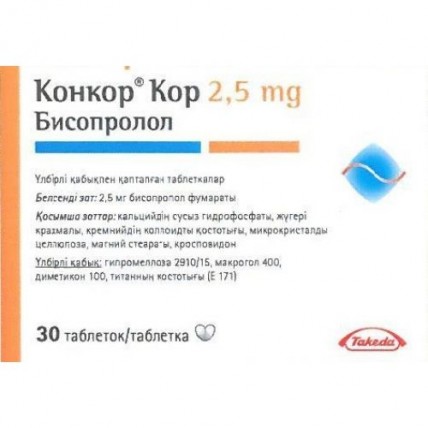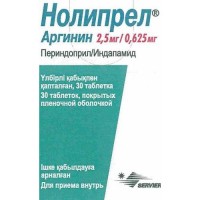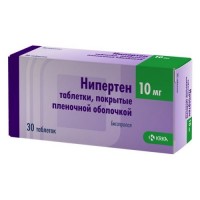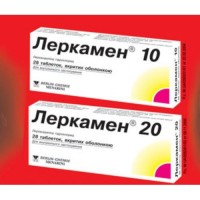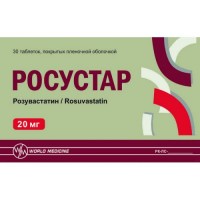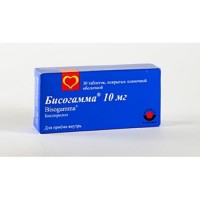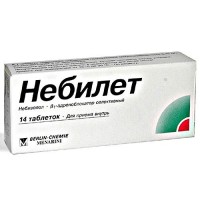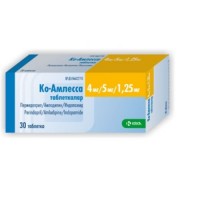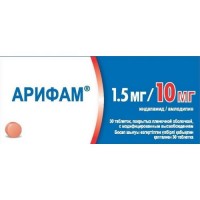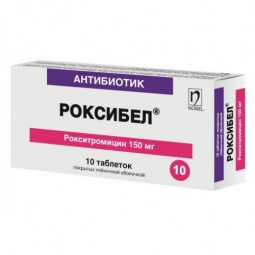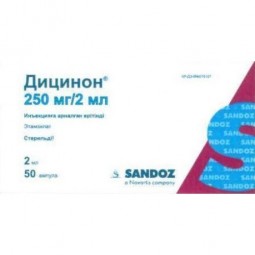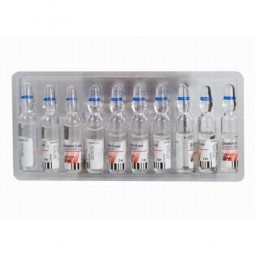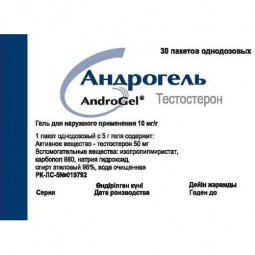Konkor Cor 30s 2.5 mg coated tablets
- $12.40
The instruction for medical use
of Konkor® medicine of Box
the Trade name
of Konkor® of Box
the International unlicensed
name Bisoprolol Lekarstvennaya
the Tablet form, film coated 2.5 mg
Structure
One tablet, contains
active agent: the bisoprolola fumarates – 2.5 mg
excipients:
Kernel: calcium hydrophosphate anhydrous, starch corn, silicon dioxide colloidal anhydrous, cellulose microcrystalline, krospovidon, magnesium stearate
Structure of a cover: a gipromelloza 2910/15, a macrogoal 400, dimetikon 100, the titan dioxide (E 171)
the Description
of the Tablet of a heart-shaped form, biconvex, film coated white color, with risky on both parties.
Pharmacotherapeutic group
Beta blockers. Selection beta blockers.
Bisoprolol.
The ATX C 07AB07 code
the Pharmacological
Pharmacokinetics Later properties of oral administration bioavailability of a bisoprolol makes 90%. Distribution volume − 3.5 l/kg. Linking with proteins of blood plasma reaches about 30%.
Bisoprolol is brought from an organism in two ways. About 50% are metabolized in a liver with formation of inactive metabolites which then are allocated with kidneys. Other 50% are removed with urine in not changed look. The general clearance is about 15 l/hour. The plasma elimination half-life of blood making 10-12 hours provides 24-hour effect after use of a dose once a day.
The kinetics of a bisoprolol linear also does not depend on age.
Special groups of patients
the Pharmacokinetics at patients with the stable chronic heart failure (CHF) and impaired renal function or a liver was not studied. At patients with chronic heart failure (functional class III on classification of the New York association of heart (NYHA)) concentration of a bisoprolol in blood plasma and elimination half-life is more in comparison with indicators at healthy volunteers.
The pharmacodynamics
Bisoprolol, active ingredient of the drug Konkor®Kor, is high-selection beta1-adrenoblocker, without own sympathomimetic activity, not possessing clinically significant membrane stabilizing action. Bisoprolol has low affinity to beta2-receptors of smooth muscles of bronchial tubes and vessels and also to the beta2-receptors relating to regulation of a metabolism. Therefore, bisoprolol in general does not cause resistance of airways and the beta2-mediated metabolic effects. Selective effect of drug extends to beta1-receptors for a framework of a therapeutic dose.
Indications
- treatment of stable chronic heart failure with reduced systolic function of a left ventricle, in addition to inhibitors of angiotensin-converting enzyme (iAPF) and diuretics, and, optionally, cardiac glycosides.
The route of administration and doses
Standard treatment of HSN consists of iAPF (or, in case of intolerance of iAPF, a blocker of receptors to angiotensin), a beta-blocker, diuretics, and in case of need cardiac glycosides. The condition of patients has to be stable (without acute heart failure) at treatment initiation bisoprololy. It is desirable that the attending physician had experience of treatment of patients with HSN.
A route of administration
the Drug Konkor®Kor should be taken in the morning regardless of meal. Tablets should be washed down with a small amount of liquid. Tablets should not be chewed.
A dose
the Initiation of treatment of persistent chronic heart failure from the drug Konkor®Kor demands obligatory carrying out a special phase of titration.
Treatment of chronic heart failure the drug Konkor®Kor begins according to the following scheme of gradual titration of a dose. Individual adaptation depending on that can be required, how well the patient transfers the appointed dose, i.e. the dose can be increased only in case the previous dose was well transferred.
1 week
of 1.25 mg
of a bisoprolol fumarates (1/2 tablets Конкор®Кор 2.5 of mg) daily once a day
the 2nd week
of 2.5 mg
of a bisoprolol
the 3rd week
of 3.75 mg
of a bisoprolol fumarates (1 tablet Конкор®Кор 2.5 of mg) daily once a day
4-7 week
of 5 mg
of a bisoprolol fumarate (1.5 tablets Конкор®Кор 2.5 of mg) daily once a day
8-11 week
of 7.5 mg
of a bisoprolol fumarate daily once a day *
the 12th week fumarates daily once a day * and after
10 mg
of a bisoprolol fumarates daily once a day as maintenance therapy *
* Конкор®Кор 2.5 mg is suitable for initial treatment of stable chronic heart failure. Higher dosages are suitable for maintenance therapy.
The maximum recommended dose of a bisoprolol of the fumarat makes 10 mg once a day. During a phase of titration and after it temporary deterioration in heart failure, hypotension or bradycardia can be observed. Therefore careful observation of vital signs (blood pressure, ChSS) and symptoms of progressing of heart failure is required.
Treatment modification
If during a phase of titration or after it is observed temporary deterioration in heart failure, hypotension or bradycardia develops, revision of a dosage of the accompanying drug is recommended. Also temporary decrease in a dosage of a bisoprolol or suspension of treatment can be required.
After stabilization of a condition of the patient it is necessary to carry out repeated titration or to continue treatment.
Treatment duration for all indications
Therapy by the drug Konkor®Kor usually is long.
Do not interrupt sharply treatment and do not change the recommended dose without consultation with your doctor as it can lead to temporary aggravation of symptoms of heart. Especially it is not necessary to interrupt suddenly therapy at patients with coronary heart disease. If suspension of treatment is necessary, the dose has to decrease gradually. It is necessary to carry out regular monitoring of patients at initiation of treatment and at the termination of administration of drug of Konkor®Kor.
Special groups of patients
the Renal failure or a liver
Because of approximately identical removal of a bisoprolol kidneys and a liver, patients with a renal or liver failure do not need to adjust a drug Konkor®Kor dose. Titration of a dose in these groups of patients should be carried out with extra care.
Elderly patients:
Dose adjustment is not required.
Side effect
the Frequency of side effects of drug is regarded as follows: very frequent (≥ 1/10), frequent (≥ 1/100, & lt, 1/10), infrequent (≥ 1/1000, & lt, 1/100), rare (≥ 1/10,000, & lt, 1/1000), very rare (& lt, 1/10,000), frequency is unknown (it cannot be established on the basis of the available data).
Mental disorders:
Infrequently: sleep disorder, depression.
Seldom: nightmares, hallucinations.
Disturbances from nervous system:
Often: dizziness, headache.
Seldom: syncope.
Disturbances from organs of sight:
Seldom: decrease in a slezootdeleniye (that should be considered at use of contact lenses).
Very seldom: conjunctivitis.
Disturbances from organs of hearing and balance:
Seldom: hearing disorder.
Disturbances from heart:
Very often: bradycardia.
Often: deterioration in heart failure.
Infrequently: disturbances of atrioventricular conductivity.
Disturbances from vessels:
Often: cryesthesia or numbness in extremities, hypotension.
Infrequently: orthostatic hypotension.
Disturbances from the respiratory system, bodies of a thorax and mediastinum:
Infrequently: a bronchospasm at patients with bronchial asthma or an obstructive respiratory disease in the anamnesis.
Seldom: allergic cold.
Disturbances from digestive tract:
Often: disturbances of work of digestive tract, such as nausea, vomiting, diarrhea, zaporoshok
Disturbances from a liver and biliary tract:
Seldom: hepatitis.
Disturbances from skin and hypodermic fabrics:
Seldom: reactions of hypersensitivity (itching, reddening, rash).
Very seldom: alopecia. Beta-blockers can provoke or worsen psoriasis or cause rashes, characteristic of psoriasis.
Disturbances from skeletal and muscular and connecting fabrics:
Infrequently: muscle weakness and spasms.
Disturbances from a reproductive system and a mammary gland:
Seldom: disturbance of potency.
General disorders:
Often: weakness, fatigue.
Laboratory indicators:
Seldom: increase in level of triglycerides, increase in level of enzymes of a liver (ACT, ALT).
Inform your attending physician if you find in yourself any of the listed side effects, either any other undesirable or unexpected effects.
It is very important to report the message about the suspected by-effects about any suspected by-effects. It allows to control continuously a ratio profile advantage/risk of this medicine.
Contraindications
the Drug Konkor®Kor should not be used at patients with the following diseases:
- an acute heart failure or during episodes the decompensation of heart failure demanding performing intravenous inotropic therapy
- cardiogenic shock
- atrioventricular block of the second or third degree
- a sick sinus syndrome
- sinuatrial blockade
- symptomatic bradycardia
- symptomatic hypotension
- heavy bronchial asthma
- severe forms of peripheral occlusal damages of arteries or Reynaud's syndrome
- an uncured pheochromocytoma
- a metabolic acidosis
- hypersensitivity to a bisoprolol or to any of excipients
- children's and teenage age up to 18 years
With care
− a bronchospasm (bronchial asthma, obstructive respiratory diseases)
- diabetes with considerable fluctuations of level of glucose in blood, symptoms of a hypoglycemia can mask
- a rigid diet
- the continuing desensibilizing therapy. As well as other beta-blockers, bisoprolol the sensitivity to allergens can raise and increase expressiveness of anaphylactic reactions. Treatment with epinephrine is not always provided by the expected therapeutic effect.
- the first extent of AV blockade
- Printsmetal's stenocardia
- peripheral occlusal damages of arteries (after the beginning of therapy there can be an aggravation of symptoms)
- the general anesthesia
Medicinal interactions
the Concomitant use of other drugs can affect effect and tolerance of drug. Similar interactions can also happen if from the moment of acceptance of other drug there passed not enough time. Inform your attending physician if you take any other drugs even if they to you were appointed not by your doctor.
Simultaneous use is not recommended
Antagonists of calcium of type of verapamil and to a lesser extent, diltiazem, at simultaneous use with the drug Konkor®Kor can lead to decrease in sokratitelny ability of a cardiac muscle and delay carrying out atrioventricular impulses. In particular, intravenous administration of verapamil to the patients receiving therapy by beta-blockers can lead to deep hypotension and atrioventricular block.
Antiarrhytmic means of 1 class (for example, quinidine, Disopyramidum, lidocaine, Phenytoinum, flekainid, propafenon) can enhance overwhelming effect of the drug Konkor®Kor concerning atrioventricular conductivity and sokratitelny ability of a cardiac muscle.
The concomitant use of antihypertensive drugs of the central action (such as clonidine, Methyldopum, moksonidin, rilmenidin) with bisoprololy can aggravate heart failure as a result of decrease in the central sympathetic tone (decrease in heart rate and warm emission, a vazodilatation). Sharp cancellation, especially before cancellation of beta-blockers can increase risk of developing "ricochet" hypertensia.
The care at simultaneous use is required
Antagonists of calcium as dihydropyridine (for example, felodipin, amlodipin) at simultaneous use with the drug Konkor®Kor can increase risk of developing hypotension. At patients with heart failure it is impossible to exclude risk of the subsequent deterioration in pump function of ventricles.
Antiarrhytmic drugs III of a class (for example, Amiodaronum) can enhance overwhelming effect of the drug Konkor®Kor on carrying out atrioventricular impulses.
Action of local beta-blockers (for example, eye drops for treatment of glaucoma) can be summarized with system effects of the drug Konkor®Kor.
Parasympathomimetic drugs at simultaneous use with the drug Konkor®Kor can enhance overwhelming effect on carrying out atrioventricular impulses and increase risk of developing bradycardia.
Antihyperglycemic effect of insulin or anti-diabetic drugs for oral administration can amplify. Signs of decrease in level of glucose in blood (hypoglycemia) can mask or be suppressed.
The anesthetizing drugs can increase risk of overwhelming effect of the drug Konkor®Kor by heart, lead to hypotension.
Cardiac glycosides (digitalis) at simultaneous use with the drug Konkor®Kor can lead to increase in time of carrying out an impulse, and thus, to decrease in ChSS.
Non-steroidal anti-inflammatory drugs (NPVS) can reduce hypotensive effect of the drug Konkor®Kor.
Simultaneous use of the drug Konkor®Kor and beta sympathomimetics (for example, an izoprenalina, Dobutaminum) can lead to decrease in effect of both drugs.
The drug Konkor®Kor combination to the sympathomimetics activating both a beta, and alpha adrenoceptors (for example, noradrenaline, adrenaline) can enhance the vasopressor effects of these drugs mediated by alpha adrenoceptors, leading to increase in blood pressure. Similar interactions are more probable at use of non-selective beta-blockers.
Antihypertensive drugs, also as well as other means with possible antihypertensive effect (for example, tricyclic antidepressants, barbiturates, fenotiazina) can enhance hypotensive effect of the drug Konkor®Kor.
The risk of bradycardia can increase the combinations which are subject to discussion Meflokhin at simultaneous use with the drug Konkor®Kor.
Monoamine oxidase inhibitors (except for monoamine oxidase inhibitors B) can enhance hypotensive effect of beta-blockers. Simultaneous use can also lead to development of hypertensive crisis.
Special instructions
Special groups of patients: at the moment there is no sufficient therapeutic experience of use of the drug Konkor®Kor for patients with heart failure and the accompanying achrestic diabetes of the I type, heavy renal failures, heavy abnormal liver functions, a restrictive cardiomyopathy, congenital heart diseases or organic defects of valves of heart breaking a hemodynamics. Also there is no sufficient therapeutic experience of use of the drug Konkor®Kor for patients with heart failure and a myocardial infarction within the first 3 months.
General anesthesia: at the patients who are under the general anesthesia, blockade of beta and adrenergic receptors reduces the frequency of development of arrhythmias and ischemia of a myocardium during induction of an anesthesia and an intubation and also during the postoperative period. Now it is recommended to continue the supporting blockade of beta and adrenergic receptors perioperatsionno. The anesthesiologist should be warned surely about reception of blockers of beta and adrenergic receptors because of a possibility of interaction with other drugs that can lead to development of bradyarrhythmia, easing of reflex tachycardia and decrease in reflex ability to offset a loss of blood. In need of therapy cancellation by beta-blockers before surgery, it should be carried out gradually and to finish in 48 hours prior to an anesthesia.
Respiratory system: though cardioselective (β1) beta-blockers can influence less function of lungs in comparison with non-selective beta-blockers, as well as all beta-blockers, they should not be applied by patients with obstructive respiratory diseases if there are no good reasons for their use. If such reasons exist, Konkor®Kor can be used with care. At patients with obstructive respiratory diseases the Konkor®Kor drug treatment has to be begun with the lowest possible dose. Besides, at patients the careful monitoring regarding emergence of new symptoms has to be carried out (for example, short wind, intolerance of physical activities, cough). In bronchial asthma or other chronic obstructive pulmonary diseases which can cause symptoms at the same time it is necessary to appoint bronkhodilatiruyushchy drugs. At patients with asthma the increase in resistance of airways can be noted therefore increase in a dosage of beta2-stimulators can be necessary.
Psoriasis: patients with psoriasis or psoriasis in the anamnesis have to accept beta-blockers (for example, bisoprolol) only after careful comparison of advantage and risks.
Pheochromocytoma: at patients a pheochromocytoma of Konkor®Kor it can be appointed only after the previous blockade of alpha receptors.
Thyrotoxicosis: at the Konkor®Kor drug treatment the symptoms of hyperfunction of a thyroid gland (thyrotoxicosis) can mask.
Pregnancy and the period of a lactation
Pregnancy
Pharmacological action of a bisoprolol can make harmful effects on pregnancy and/or the fruit/newborn. As a rule, blockers of beta and adrenergic receptors reduce a placentary blood stream that contacts growth delay, pre-natal death, abortions or premature births. Undesirable effects (for example, a hypoglycemia and bradycardia) can arise at a fruit and the newborn. If treatment by blockers of beta and adrenergic receptors is necessary, it is preferable to accept selection blockers of beta1-adrenoceptors.
Use of the drug Konkor®Kor is possible only at unambiguous need. If the Konkor®Kor drug treatment is necessary, it is necessary to control an uteroplacental blood stream and growth of a fruit. In case of adverse influence on pregnancy or a fruit it is necessary to consider the possibility of alternative methods of treatment. It is necessary to watch attentively the newborn after the delivery. Symptoms of a hypoglycemia and bradycardia usually should be expected in the first three days of life.
The period of a lactation
of Data on discharge of a bisoprolol with breast milk is not present. Therefore, in the period of a lactation the use of the drug Konkor®Kor is not recommended.
Features of influence of medicine on ability to run the vehicle or potentially dangerous mechanisms
In a research at the patients having diseases of coronary vessels of heart bisoprolol did not affect ability to driving. However, depending on individual reaction of the patient to treatment, ability to driving and control of mechanisms it can be broken. On it it is necessary to pay special attention before an initiation of treatment, when changing drugs and also at simultaneous alcohol intake.
Overdose
Symptoms: at overdose (for example, at a daily dose in 15 mg instead of 7.5 mg) atrioventricular block of the third degree, bradycardia and dizziness were observed. Generally the most frequent symptoms of overdose of beta-blockers are bradycardia, hypotension, a bronchospasm, an acute heart failure and a hypoglycemia. For today several cases of overdose of a bisoprolol are known (the maximum dose: 2000 mg) at the patients having a hypertension and/or a coronary artery disease with symptoms of bradycardia and/or hypertensia, all patients recovered after overdose. There is a big individual variability of sensitivity to a single high dose of a bisoprolol, and patients with heart failure probably have very high sensitivity. Therefore, treatment of these patients the drug Konkor®Kor should be begun with gradual increase in a dose according to the scheme provided in the section "Route of Administration and Doses".
Treatment: in case of overdose it is necessary to stop the Konkor®Kor drug treatment and to carry out the supporting and symptomatic treatment. There are limited data that bisoprolol is almost not removed by means of dialysis. Proceeding from expected pharmacological actions and recommendations about other beta-blockers, it is necessary to consider the following general measures at the corresponding clinical indications.
Bradycardia: intravenous administration of atropine. If treatment response is insufficient, with care it is possible to enter izoprenalin or other drug with positive chronotropic properties. In some circumstances the installation of a transvenous pacemaker can be necessary.
Arterial hypotension: it is necessary to apply intravenous administration of solutions and vasoconstrictive substances. Also there can be useful an intravenous administration of a glucagon.
Atrioventricular block (second or third degree): it is necessary to carry out careful monitoring and treatment of patients by infusional introduction of an izoprenalin or installation of a transvenous pacemaker.
Deterioration in heart failure (sharp): intravenous administration of diuretics, inotropic drugs, vasodilators.
Bronchospasm: therapy by bronchodilators using such means, as izoprenalin, beta2-sympathomimetics and/or Aminophyllinum.
Hypoglycemia: intravenous administration of glucose.
A form of release and packing
On 30 tablets in blister strip packaging from a polyvinylchloride film and aluminum foil. On 1 blister strip packaging together with the instruction for use in the state and Russian languages place in a cardboard pack.
To Store storage conditions at a temperature not above 25 °C.
To store out of children's reach!
A period of storage
3 years
not to use drug after expiry date
Prescription status
According to the prescription
the Producer
Merk of KGaA, Germany
the Packer
Merk of KGaA, Germany
the Owner of the registration certificate
Merk of KGaA, Germany
the Address of the organization accepting in the territory of the Republic of Kazakhstan claims from consumers on quality of products (goods)
Representative office "Takeda Osteuropa Holding GmbH" (Austria)
in
Kazakhstan Almaty, Shashkin St. 44 Phone number (727) 2444004, fax number (727) 2444005
To Develop the e-mail address of DSO-KZ@takeda.com
of Konkor® medicine of Box
the Trade name
of Konkor® of Box
the International unlicensed
name Bisoprolol Lekarstvennaya
the Tablet form, film coated 2.5 mg
Structure
One tablet, contains
active agent: the bisoprolola fumarates – 2.5 mg
excipients:
Kernel: calcium hydrophosphate anhydrous, starch corn, silicon dioxide colloidal anhydrous, cellulose microcrystalline, krospovidon, magnesium stearate
Structure of a cover: a gipromelloza 2910/15, a macrogoal 400, dimetikon 100, the titan dioxide (E 171)
the Description
of the Tablet of a heart-shaped form, biconvex, film coated white color, with risky on both parties.
Pharmacotherapeutic group
Beta blockers. Selection beta blockers.
Bisoprolol.
The ATX C 07AB07 code
the Pharmacological
Pharmacokinetics Later properties of oral administration bioavailability of a bisoprolol makes 90%. Distribution volume − 3.5 l/kg. Linking with proteins of blood plasma reaches about 30%.
Bisoprolol is brought from an organism in two ways. About 50% are metabolized in a liver with formation of inactive metabolites which then are allocated with kidneys. Other 50% are removed with urine in not changed look. The general clearance is about 15 l/hour. The plasma elimination half-life of blood making 10-12 hours provides 24-hour effect after use of a dose once a day.
The kinetics of a bisoprolol linear also does not depend on age.
Special groups of patients
the Pharmacokinetics at patients with the stable chronic heart failure (CHF) and impaired renal function or a liver was not studied. At patients with chronic heart failure (functional class III on classification of the New York association of heart (NYHA)) concentration of a bisoprolol in blood plasma and elimination half-life is more in comparison with indicators at healthy volunteers.
The pharmacodynamics
Bisoprolol, active ingredient of the drug Konkor®Kor, is high-selection beta1-adrenoblocker, without own sympathomimetic activity, not possessing clinically significant membrane stabilizing action. Bisoprolol has low affinity to beta2-receptors of smooth muscles of bronchial tubes and vessels and also to the beta2-receptors relating to regulation of a metabolism. Therefore, bisoprolol in general does not cause resistance of airways and the beta2-mediated metabolic effects. Selective effect of drug extends to beta1-receptors for a framework of a therapeutic dose.
Indications
- treatment of stable chronic heart failure with reduced systolic function of a left ventricle, in addition to inhibitors of angiotensin-converting enzyme (iAPF) and diuretics, and, optionally, cardiac glycosides.
The route of administration and doses
Standard treatment of HSN consists of iAPF (or, in case of intolerance of iAPF, a blocker of receptors to angiotensin), a beta-blocker, diuretics, and in case of need cardiac glycosides. The condition of patients has to be stable (without acute heart failure) at treatment initiation bisoprololy. It is desirable that the attending physician had experience of treatment of patients with HSN.
A route of administration
the Drug Konkor®Kor should be taken in the morning regardless of meal. Tablets should be washed down with a small amount of liquid. Tablets should not be chewed.
A dose
the Initiation of treatment of persistent chronic heart failure from the drug Konkor®Kor demands obligatory carrying out a special phase of titration.
Treatment of chronic heart failure the drug Konkor®Kor begins according to the following scheme of gradual titration of a dose. Individual adaptation depending on that can be required, how well the patient transfers the appointed dose, i.e. the dose can be increased only in case the previous dose was well transferred.
1 week
of 1.25 mg
of a bisoprolol fumarates (1/2 tablets Конкор®Кор 2.5 of mg) daily once a day
the 2nd week
of 2.5 mg
of a bisoprolol
the 3rd week
of 3.75 mg
of a bisoprolol fumarates (1 tablet Конкор®Кор 2.5 of mg) daily once a day
4-7 week
of 5 mg
of a bisoprolol fumarate (1.5 tablets Конкор®Кор 2.5 of mg) daily once a day
8-11 week
of 7.5 mg
of a bisoprolol fumarate daily once a day *
the 12th week fumarates daily once a day * and after
10 mg
of a bisoprolol fumarates daily once a day as maintenance therapy *
* Конкор®Кор 2.5 mg is suitable for initial treatment of stable chronic heart failure. Higher dosages are suitable for maintenance therapy.
The maximum recommended dose of a bisoprolol of the fumarat makes 10 mg once a day. During a phase of titration and after it temporary deterioration in heart failure, hypotension or bradycardia can be observed. Therefore careful observation of vital signs (blood pressure, ChSS) and symptoms of progressing of heart failure is required.
Treatment modification
If during a phase of titration or after it is observed temporary deterioration in heart failure, hypotension or bradycardia develops, revision of a dosage of the accompanying drug is recommended. Also temporary decrease in a dosage of a bisoprolol or suspension of treatment can be required.
After stabilization of a condition of the patient it is necessary to carry out repeated titration or to continue treatment.
Treatment duration for all indications
Therapy by the drug Konkor®Kor usually is long.
Do not interrupt sharply treatment and do not change the recommended dose without consultation with your doctor as it can lead to temporary aggravation of symptoms of heart. Especially it is not necessary to interrupt suddenly therapy at patients with coronary heart disease. If suspension of treatment is necessary, the dose has to decrease gradually. It is necessary to carry out regular monitoring of patients at initiation of treatment and at the termination of administration of drug of Konkor®Kor.
Special groups of patients
the Renal failure or a liver
Because of approximately identical removal of a bisoprolol kidneys and a liver, patients with a renal or liver failure do not need to adjust a drug Konkor®Kor dose. Titration of a dose in these groups of patients should be carried out with extra care.
Elderly patients:
Dose adjustment is not required.
Side effect
the Frequency of side effects of drug is regarded as follows: very frequent (≥ 1/10), frequent (≥ 1/100, & lt, 1/10), infrequent (≥ 1/1000, & lt, 1/100), rare (≥ 1/10,000, & lt, 1/1000), very rare (& lt, 1/10,000), frequency is unknown (it cannot be established on the basis of the available data).
Mental disorders:
Infrequently: sleep disorder, depression.
Seldom: nightmares, hallucinations.
Disturbances from nervous system:
Often: dizziness, headache.
Seldom: syncope.
Disturbances from organs of sight:
Seldom: decrease in a slezootdeleniye (that should be considered at use of contact lenses).
Very seldom: conjunctivitis.
Disturbances from organs of hearing and balance:
Seldom: hearing disorder.
Disturbances from heart:
Very often: bradycardia.
Often: deterioration in heart failure.
Infrequently: disturbances of atrioventricular conductivity.
Disturbances from vessels:
Often: cryesthesia or numbness in extremities, hypotension.
Infrequently: orthostatic hypotension.
Disturbances from the respiratory system, bodies of a thorax and mediastinum:
Infrequently: a bronchospasm at patients with bronchial asthma or an obstructive respiratory disease in the anamnesis.
Seldom: allergic cold.
Disturbances from digestive tract:
Often: disturbances of work of digestive tract, such as nausea, vomiting, diarrhea, zaporoshok
Disturbances from a liver and biliary tract:
Seldom: hepatitis.
Disturbances from skin and hypodermic fabrics:
Seldom: reactions of hypersensitivity (itching, reddening, rash).
Very seldom: alopecia. Beta-blockers can provoke or worsen psoriasis or cause rashes, characteristic of psoriasis.
Disturbances from skeletal and muscular and connecting fabrics:
Infrequently: muscle weakness and spasms.
Disturbances from a reproductive system and a mammary gland:
Seldom: disturbance of potency.
General disorders:
Often: weakness, fatigue.
Laboratory indicators:
Seldom: increase in level of triglycerides, increase in level of enzymes of a liver (ACT, ALT).
Inform your attending physician if you find in yourself any of the listed side effects, either any other undesirable or unexpected effects.
It is very important to report the message about the suspected by-effects about any suspected by-effects. It allows to control continuously a ratio profile advantage/risk of this medicine.
Contraindications
the Drug Konkor®Kor should not be used at patients with the following diseases:
- an acute heart failure or during episodes the decompensation of heart failure demanding performing intravenous inotropic therapy
- cardiogenic shock
- atrioventricular block of the second or third degree
- a sick sinus syndrome
- sinuatrial blockade
- symptomatic bradycardia
- symptomatic hypotension
- heavy bronchial asthma
- severe forms of peripheral occlusal damages of arteries or Reynaud's syndrome
- an uncured pheochromocytoma
- a metabolic acidosis
- hypersensitivity to a bisoprolol or to any of excipients
- children's and teenage age up to 18 years
With care
− a bronchospasm (bronchial asthma, obstructive respiratory diseases)
- diabetes with considerable fluctuations of level of glucose in blood, symptoms of a hypoglycemia can mask
- a rigid diet
- the continuing desensibilizing therapy. As well as other beta-blockers, bisoprolol the sensitivity to allergens can raise and increase expressiveness of anaphylactic reactions. Treatment with epinephrine is not always provided by the expected therapeutic effect.
- the first extent of AV blockade
- Printsmetal's stenocardia
- peripheral occlusal damages of arteries (after the beginning of therapy there can be an aggravation of symptoms)
- the general anesthesia
Medicinal interactions
the Concomitant use of other drugs can affect effect and tolerance of drug. Similar interactions can also happen if from the moment of acceptance of other drug there passed not enough time. Inform your attending physician if you take any other drugs even if they to you were appointed not by your doctor.
Simultaneous use is not recommended
Antagonists of calcium of type of verapamil and to a lesser extent, diltiazem, at simultaneous use with the drug Konkor®Kor can lead to decrease in sokratitelny ability of a cardiac muscle and delay carrying out atrioventricular impulses. In particular, intravenous administration of verapamil to the patients receiving therapy by beta-blockers can lead to deep hypotension and atrioventricular block.
Antiarrhytmic means of 1 class (for example, quinidine, Disopyramidum, lidocaine, Phenytoinum, flekainid, propafenon) can enhance overwhelming effect of the drug Konkor®Kor concerning atrioventricular conductivity and sokratitelny ability of a cardiac muscle.
The concomitant use of antihypertensive drugs of the central action (such as clonidine, Methyldopum, moksonidin, rilmenidin) with bisoprololy can aggravate heart failure as a result of decrease in the central sympathetic tone (decrease in heart rate and warm emission, a vazodilatation). Sharp cancellation, especially before cancellation of beta-blockers can increase risk of developing "ricochet" hypertensia.
The care at simultaneous use is required
Antagonists of calcium as dihydropyridine (for example, felodipin, amlodipin) at simultaneous use with the drug Konkor®Kor can increase risk of developing hypotension. At patients with heart failure it is impossible to exclude risk of the subsequent deterioration in pump function of ventricles.
Antiarrhytmic drugs III of a class (for example, Amiodaronum) can enhance overwhelming effect of the drug Konkor®Kor on carrying out atrioventricular impulses.
Action of local beta-blockers (for example, eye drops for treatment of glaucoma) can be summarized with system effects of the drug Konkor®Kor.
Parasympathomimetic drugs at simultaneous use with the drug Konkor®Kor can enhance overwhelming effect on carrying out atrioventricular impulses and increase risk of developing bradycardia.
Antihyperglycemic effect of insulin or anti-diabetic drugs for oral administration can amplify. Signs of decrease in level of glucose in blood (hypoglycemia) can mask or be suppressed.
The anesthetizing drugs can increase risk of overwhelming effect of the drug Konkor®Kor by heart, lead to hypotension.
Cardiac glycosides (digitalis) at simultaneous use with the drug Konkor®Kor can lead to increase in time of carrying out an impulse, and thus, to decrease in ChSS.
Non-steroidal anti-inflammatory drugs (NPVS) can reduce hypotensive effect of the drug Konkor®Kor.
Simultaneous use of the drug Konkor®Kor and beta sympathomimetics (for example, an izoprenalina, Dobutaminum) can lead to decrease in effect of both drugs.
The drug Konkor®Kor combination to the sympathomimetics activating both a beta, and alpha adrenoceptors (for example, noradrenaline, adrenaline) can enhance the vasopressor effects of these drugs mediated by alpha adrenoceptors, leading to increase in blood pressure. Similar interactions are more probable at use of non-selective beta-blockers.
Antihypertensive drugs, also as well as other means with possible antihypertensive effect (for example, tricyclic antidepressants, barbiturates, fenotiazina) can enhance hypotensive effect of the drug Konkor®Kor.
The risk of bradycardia can increase the combinations which are subject to discussion Meflokhin at simultaneous use with the drug Konkor®Kor.
Monoamine oxidase inhibitors (except for monoamine oxidase inhibitors B) can enhance hypotensive effect of beta-blockers. Simultaneous use can also lead to development of hypertensive crisis.
Special instructions
Special groups of patients: at the moment there is no sufficient therapeutic experience of use of the drug Konkor®Kor for patients with heart failure and the accompanying achrestic diabetes of the I type, heavy renal failures, heavy abnormal liver functions, a restrictive cardiomyopathy, congenital heart diseases or organic defects of valves of heart breaking a hemodynamics. Also there is no sufficient therapeutic experience of use of the drug Konkor®Kor for patients with heart failure and a myocardial infarction within the first 3 months.
General anesthesia: at the patients who are under the general anesthesia, blockade of beta and adrenergic receptors reduces the frequency of development of arrhythmias and ischemia of a myocardium during induction of an anesthesia and an intubation and also during the postoperative period. Now it is recommended to continue the supporting blockade of beta and adrenergic receptors perioperatsionno. The anesthesiologist should be warned surely about reception of blockers of beta and adrenergic receptors because of a possibility of interaction with other drugs that can lead to development of bradyarrhythmia, easing of reflex tachycardia and decrease in reflex ability to offset a loss of blood. In need of therapy cancellation by beta-blockers before surgery, it should be carried out gradually and to finish in 48 hours prior to an anesthesia.
Respiratory system: though cardioselective (β1) beta-blockers can influence less function of lungs in comparison with non-selective beta-blockers, as well as all beta-blockers, they should not be applied by patients with obstructive respiratory diseases if there are no good reasons for their use. If such reasons exist, Konkor®Kor can be used with care. At patients with obstructive respiratory diseases the Konkor®Kor drug treatment has to be begun with the lowest possible dose. Besides, at patients the careful monitoring regarding emergence of new symptoms has to be carried out (for example, short wind, intolerance of physical activities, cough). In bronchial asthma or other chronic obstructive pulmonary diseases which can cause symptoms at the same time it is necessary to appoint bronkhodilatiruyushchy drugs. At patients with asthma the increase in resistance of airways can be noted therefore increase in a dosage of beta2-stimulators can be necessary.
Psoriasis: patients with psoriasis or psoriasis in the anamnesis have to accept beta-blockers (for example, bisoprolol) only after careful comparison of advantage and risks.
Pheochromocytoma: at patients a pheochromocytoma of Konkor®Kor it can be appointed only after the previous blockade of alpha receptors.
Thyrotoxicosis: at the Konkor®Kor drug treatment the symptoms of hyperfunction of a thyroid gland (thyrotoxicosis) can mask.
Pregnancy and the period of a lactation
Pregnancy
Pharmacological action of a bisoprolol can make harmful effects on pregnancy and/or the fruit/newborn. As a rule, blockers of beta and adrenergic receptors reduce a placentary blood stream that contacts growth delay, pre-natal death, abortions or premature births. Undesirable effects (for example, a hypoglycemia and bradycardia) can arise at a fruit and the newborn. If treatment by blockers of beta and adrenergic receptors is necessary, it is preferable to accept selection blockers of beta1-adrenoceptors.
Use of the drug Konkor®Kor is possible only at unambiguous need. If the Konkor®Kor drug treatment is necessary, it is necessary to control an uteroplacental blood stream and growth of a fruit. In case of adverse influence on pregnancy or a fruit it is necessary to consider the possibility of alternative methods of treatment. It is necessary to watch attentively the newborn after the delivery. Symptoms of a hypoglycemia and bradycardia usually should be expected in the first three days of life.
The period of a lactation
of Data on discharge of a bisoprolol with breast milk is not present. Therefore, in the period of a lactation the use of the drug Konkor®Kor is not recommended.
Features of influence of medicine on ability to run the vehicle or potentially dangerous mechanisms
In a research at the patients having diseases of coronary vessels of heart bisoprolol did not affect ability to driving. However, depending on individual reaction of the patient to treatment, ability to driving and control of mechanisms it can be broken. On it it is necessary to pay special attention before an initiation of treatment, when changing drugs and also at simultaneous alcohol intake.
Overdose
Symptoms: at overdose (for example, at a daily dose in 15 mg instead of 7.5 mg) atrioventricular block of the third degree, bradycardia and dizziness were observed. Generally the most frequent symptoms of overdose of beta-blockers are bradycardia, hypotension, a bronchospasm, an acute heart failure and a hypoglycemia. For today several cases of overdose of a bisoprolol are known (the maximum dose: 2000 mg) at the patients having a hypertension and/or a coronary artery disease with symptoms of bradycardia and/or hypertensia, all patients recovered after overdose. There is a big individual variability of sensitivity to a single high dose of a bisoprolol, and patients with heart failure probably have very high sensitivity. Therefore, treatment of these patients the drug Konkor®Kor should be begun with gradual increase in a dose according to the scheme provided in the section "Route of Administration and Doses".
Treatment: in case of overdose it is necessary to stop the Konkor®Kor drug treatment and to carry out the supporting and symptomatic treatment. There are limited data that bisoprolol is almost not removed by means of dialysis. Proceeding from expected pharmacological actions and recommendations about other beta-blockers, it is necessary to consider the following general measures at the corresponding clinical indications.
Bradycardia: intravenous administration of atropine. If treatment response is insufficient, with care it is possible to enter izoprenalin or other drug with positive chronotropic properties. In some circumstances the installation of a transvenous pacemaker can be necessary.
Arterial hypotension: it is necessary to apply intravenous administration of solutions and vasoconstrictive substances. Also there can be useful an intravenous administration of a glucagon.
Atrioventricular block (second or third degree): it is necessary to carry out careful monitoring and treatment of patients by infusional introduction of an izoprenalin or installation of a transvenous pacemaker.
Deterioration in heart failure (sharp): intravenous administration of diuretics, inotropic drugs, vasodilators.
Bronchospasm: therapy by bronchodilators using such means, as izoprenalin, beta2-sympathomimetics and/or Aminophyllinum.
Hypoglycemia: intravenous administration of glucose.
A form of release and packing
On 30 tablets in blister strip packaging from a polyvinylchloride film and aluminum foil. On 1 blister strip packaging together with the instruction for use in the state and Russian languages place in a cardboard pack.
To Store storage conditions at a temperature not above 25 °C.
To store out of children's reach!
A period of storage
3 years
not to use drug after expiry date
Prescription status
According to the prescription
the Producer
Merk of KGaA, Germany
the Packer
Merk of KGaA, Germany
the Owner of the registration certificate
Merk of KGaA, Germany
the Address of the organization accepting in the territory of the Republic of Kazakhstan claims from consumers on quality of products (goods)
Representative office "Takeda Osteuropa Holding GmbH" (Austria)
in
Kazakhstan Almaty, Shashkin St. 44 Phone number (727) 2444004, fax number (727) 2444005
To Develop the e-mail address of DSO-KZ@takeda.com
